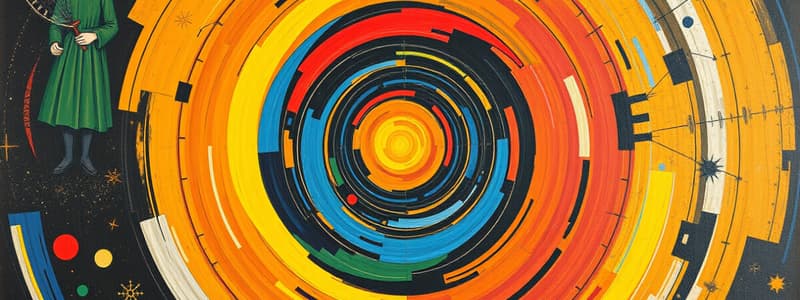Podcast
Questions and Answers
How can science be defined?
How can science be defined?
Science can be defined as an intellectual activity that comprises a body of knowledge.
Which model of the universe placed the Sun at the center?
Which model of the universe placed the Sun at the center?
- Copernican model (correct)
- Einsteinian model
- Ptolemaic model
- Newtonian model
What is Charles Darwin famous for?
What is Charles Darwin famous for?
Charles Darwin is famous for his theory of evolution.
Sigmund Freud is known for his contributions to psychology.
Sigmund Freud is known for his contributions to psychology.
Match the following parts of personality with their characteristics:
Match the following parts of personality with their characteristics:
The major conflict during the Oral stage of development is weaning off of ______.
The major conflict during the Oral stage of development is weaning off of ______.
What significant contributions did the Maya civilization make?
What significant contributions did the Maya civilization make?
What is the major conflict during the Anal stage of development?
What is the major conflict during the Anal stage of development?
Which civilization is known for their quipu system to keep records?
Which civilization is known for their quipu system to keep records?
The Inca civilization did not have a calendar system.
The Inca civilization did not have a calendar system.
Flashcards are hidden until you start studying
Study Notes
Science Overview
- Science is defined as a systematic pursuit of knowledge that seeks to understand the natural world.
- It serves as an intellectual activity characterized by observation, experimentation, and the formulation of theories.
- Science encompasses a body of knowledge that allows for predictions and explanations of phenomena.
- It functions both as a personal pursuit for understanding and a social activity that fosters collaboration and communication among individuals.
Nicolaus Copernicus
- Proposed the heliocentric model, placing the Sun at the center of the universe.
- Identified planetary motion: Venus and Mercury orbits are inside Earth's orbit, while Mars, Saturn, and Jupiter are outside Earth's orbit.
Charles Darwin
- Renowned for his theory of evolution, presented in The Origin of Species (1859).
- Evidence in his work illustrates species evolution over time, emphasizing traits and adaptations.
- In The Descent of Man, he expanded evolutionary thinking to encompass all organic life, including humans.
- Advocated for an evidence-based approach to science, focusing on observation and experimentation.
Sigmund Freud
- Key figure in psychoanalysis, which examines the impact of the unconscious mind on behavior.
- Developed psychoanalysis as an observational method that focuses on human sexuality and emotional experiences.
- His approach was regarded as unorthodox but effective in addressing neurological conditions previously misunderstood by medical practice.
Freud's Structural Model of Personality
- The ID: Represents the unconscious and instinctive drives, focused on pleasure.
- The Ego: Balances desires of the ID with the constraints of reality and social norms.
- The SuperEgo: Develops through socialization and embodies moral standards and ideals.
Freud's Psychosexual Stages of Development
- Oral Stage (Birth to 18 months): Focuses on the mouth; major conflict involves weaning, with fixation leading to behaviors like smoking or overeating.
- Anal Stage (18 months to 3 years): Centers on bowel control; toilet training is the major conflict, resulting in fixation characterized by orderliness or messiness.
- Phallic Stage (3-6 years): Focuses on genital awareness; major conflicts involve resolving Oedipus and Electra complexes, leading to potential deviations or dysfunctions.
- Latency Stage (6 years to puberty): Sexual feelings are dormant; emphasis on developing defense mechanisms, with no specific fixation.
- Genital Stage (12+ years): Focuses on mature sexual relationships; successful completion of earlier stages leads to sexual maturity and mental health.
Mesoamerican Civilizations
-
The Maya civilization thrived for around 2,000 years, excelling in astronomy, eclipse prediction, and complex calendar systems.
-
Known for agricultural advancements, urban development, and innovative technologies like looms and early rubber production.
-
Developed a writing system (Mayan hieroglyphics) and a numeral system based on the concept of zero and positional value.
-
The Inca civilization is notable for practical innovations that facilitated daily life, including:
- Constructed stone-paved roads and earthquake-resistant buildings.
- Developed irrigation systems and water storage techniques for crops.
- Established a 12-month calendar for agricultural planning and religious festivals.
- Created the first suspension bridge and quipu, a record-keeping system using knotted ropes.
Studying That Suits You
Use AI to generate personalized quizzes and flashcards to suit your learning preferences.




